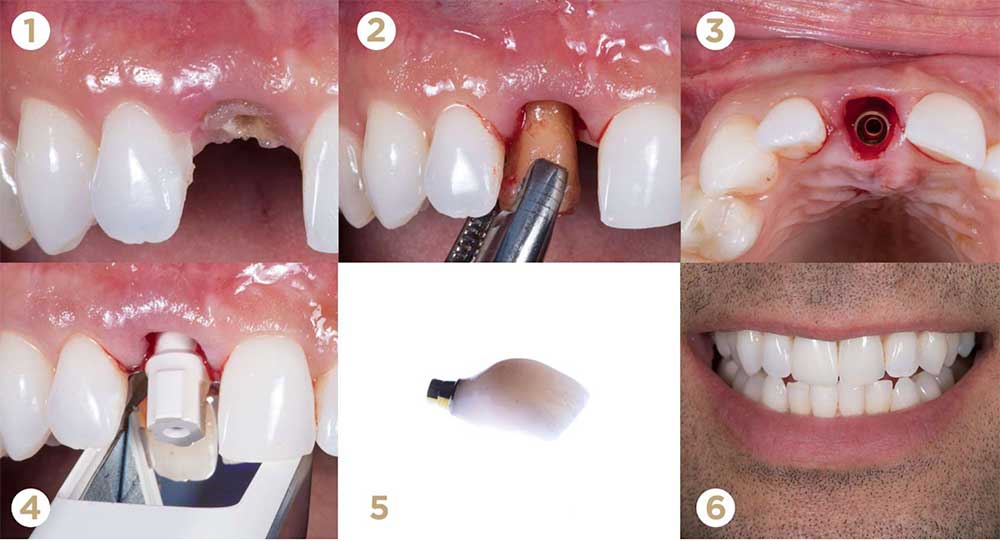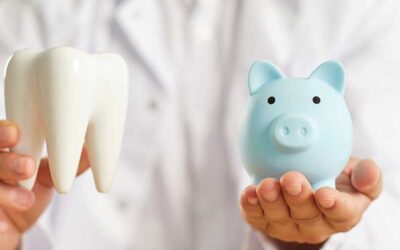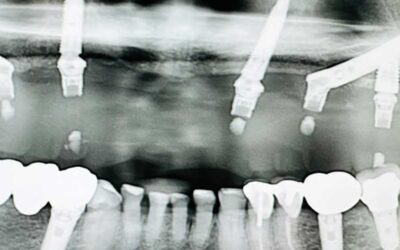What You Need To Know About Peri-Implantitis
Dental implants are no doubt the best way to replace missing natural teeth. With a high success rate of just over 98%, an implant can potentially last the rest of your life if your oral health is maintained properly. However, bacterial mouth infections like peri-implant disease can cause bone loss around a dental implant, placing them at an extremely high risk for implant failure.
Fortunately, a failing implant with peri-implant mucositis can be treated in Los Angeles to help combat implant gum disease and avoid failure of your investment. The Center for Advanced Periodontal & Implant Therapy offers peri-implant therapies for all implant patients, even if we did not perform your initial implant placement.
Patients story about we fixed his gum disease and gum infections from the implants that another dentist had done.

Peri-Implantitis vs. Periodontitis
The way dental implants function is similar to a natural tooth. Except with natural teeth, there are hundreds of tiny ligaments attached to the tooth root and the surrounding bone supporting the roots of your teeth. A dental implant surface doesn’t have those ligaments, so if a bacterial infection like gingivitis or gum disease starts to develop, the gum line may start to give out more quickly.
With traditional gum disease, pockets develop around teeth because of a lack of brushing, flossing, or overall good oral hygiene. Surgical treatment or deep cleanings help remove the source of infection, tightening the soft tissues and minimizing additional bone loss.
But with a peri-implant disease, the dental implant sits directly inside of the supporting bone. If harmful bacteria invade the gum line, the gums can detach and cause a serious mouth infection around the implant that spreads at a much quicker rate than normal gum disease. Left untreated, peri-implant diseases can cause complete loss of the implants at that location. And unfortunately, the bone loss can also impact adjacent teeth and implants.
What Are The Symptoms Of Peri-Implantitis?
Peri-implantitis occurs when there is an accumulation of bacteria and food particles around the implant at your gum line. The early symptoms include bleeding when you brush and floss, gum redness, and tissue inflammation. A deeper gum pocket around implants will also attract your dentist’s attention during your dental exam. In addition, there is a chance that you will be able to see exposure of part of the implant where the gums have receded. Like gingivitis, early stage peri-implantitis is preventable and managed with good home care. But without adequate supervision, such dental conditions eventually lead to a higher risk of implant loss and mobility. The good news is that peri-implant mucositis can be treated by a specialist, especially if caught early enough.
Peri-Implantitis Treatment Options
Ultimately the first step in treating an infection around your implants is to remove the harmful bacteria surrounding your soft tissues and implant surfaces. Modified brushing and flossing habits are the first steps. From there, we will assess your risk factors and extent of bone loss or dental implant exposure. Surgical treatment or adjustments to your gum tissue can halt the progression of peri-implant diseases so that you can preserve your implants in the years to come.
Soft Tissue Grafts in Los Angeles
Perhaps your gum lines are only in the early stages of peri-implant disease, exposing a small surface of the implant beneath your crown. A minimally invasive surgical treatment of your soft tissues known as “grafting” or “soft tissue augmentation” may be ideal. This procedure positions gum tissue over the exposed area of your implant, repairing areas of tissue loss (recession) from previous bacterial infections. Patients affected by mild gum recession or a poorly positioned implant can find quick results from a soft tissue graft.
Smoothing Exposed Implant Threads
The ribbed or threaded surface of your dental implant can, if exposed, irritate your gums and gradually accumulate more plaque buildup. If the rough threads are rubbing your gums, it can lead to continued symptoms of early stage gum disease. In this scenario, we can smooth the ribbed areas that are exposed, creating a smoother surface that’s gentler to your bleeding gums. This step will help prevent peri-implantitis or undue discomfort, as it discourages plaque buildup and other bacterial mouth infections from buildup.
Removing the “Tooth” and Covering the Implant
For aggressive peri-implant disease, where the bacterial infection is so severe that there is severe bone loss in the bone supporting your dental implants, the most aggressive treatment would be to remove the crown, bridge, or implant restoration and cover your implants with gum tissue. Then we wait. The goal is for new bone to integrate and re-fuse itself to the surface of the dental implant, creating new bone supporting your fixed restoration. After several months (and as long as the bone loss is halted), the implant is uncovered, and your restoration is re-attached to it. Bone augmentation (bone grafting) may also be performed around the affected dental implants before the gums are closed over them.
Can You Tell Me the Cause of Peri-Implantitis?
Prior gum disease and poor oral health habits are the two main factors contributing to peri-implant disease. If you’ve had periodontal disease in the past, you may be more prone to peri-implantitis. The oral infection will need to be stabilized before your dental implants are installed. Additionally, you will need to be sure to change your oral health habits and hygiene practices to prevent peri-implant diseases, as dental implants require the same preventative care as natural teeth.
Does It Matter Which Periodontist You Use?
Yes. Any competent dentist will seek out expert care for managing or treating peri-implantitis or aggressive periodontal disease. For someone at risk for implant loss, bone disease can be extremely frustrating. Our patients suffering from severe symptoms of mouth infection around their implants should work with a gum and implant specialist to ensure the success of their smile’s future.
Knowledge is Power
If you have bleeding or swollen gums around your dental implants, contact our periodontal specialists immediately. Our Los Angeles experts can provide appropriate peri-implantitis treatment even if we did not place your dental implants. No referrals are necessary. Contact our office today to intercept your peri-implant disease before the damage is permanent.
You May Also Like...
Understanding the Microbiome of the Mouth: Why Balance Matters for Gum Health
We often think of brushing, flossing, and regular cleanings as the cornerstones of oral health. But beneath these...
How Much Do Dental Implants Cost in Southern California? A Complete Guide
If you're considering dental implants in Southern California, you’re likely wondering: How much will they cost? Are...
Can Zygomatic and Pterygoid Implants Be Done in a Day? Breaking Down the Process
Losing bone in the upper jaw can feel overwhelming, especially if you've been told traditional implants aren’t an...



